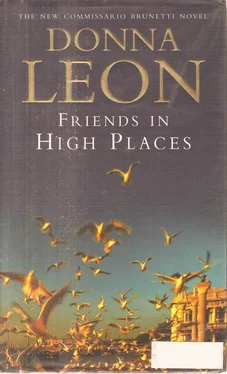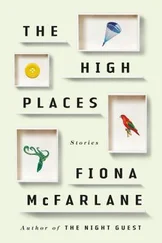When he judged that Brunetti had finished, Contarini pulled his briefcase up on to his lap and opened it. He sorted through papers and Brunetti felt the hairs on his arms rise when he realized how similar his fussy actions were to those of Rossi. With a little snort of pleasure, Contarini found the paper he was looking for and pulled it out. He extended it across the desk towards Brunetti, ‘As you can see, Commissario,’ he said, pointing to the seal at the top of the paper but not letting go of it, ‘this is a certificate from the Ministry of Health, dated more than ten years ago.’ He pulled his chair closer to the desk. When he was sure that Brunetti’s attention was directed at the paper, he continued, ‘which declares that Giovanni Dolfin is…’ and paused, gracing Brunetti with yet another smile, a shark preparing to get down to business.
Though it was upside down, he began to read the text out slowly to Brunetti: ‘ “a person with special needs who is to receive special preference in obtaining employment and is never to be discriminated against because of any inability to perform tasks beyond his powers.” ‘
He moved a finger down the paper until it pointed to the last paragraph, which he read out, as well. “’The person above named, Giovanni Dolfin, is declared not to be in complete possession of his intellectual faculties and hence is not to be subjected to the full rigour of the law.” ‘
Contarini let go of the paper and watched it flutter quietly to the surface of Brunetti’s desk. Smiling still, he said, ‘That’s a copy. For your files. I assume you’re familiar with such documents, Commissario?’
Brunetti’s family were passionate Monopoly players, and here it was to the life: a Get Out of Gaol Free card.
Contarini closed his briefcase and got to his feet. ‘I’d like to see my client, if that’s possible.’
‘Of course,’ Brunetti said, reaching for his phone.
The three of them sat in silence until Pucetti knocked at the door.
‘Officer Pucetti,’ Brunetti said, touched to see that the young man was out of breath, having run up the stairs in answer to Brunetti’s summons, ‘please take Avvocato Contarini down to room seven to see his client.’
Pucetti snapped a salute. Contarini got to his feet and looked enquiringly at Signorina Dolfin, but she shook her head and remained where she was. Contarini said polite things and left, smiling all the way.
When he was gone, Brunetti, who had stood up at Contarini’s departure, sat down again and looked across at Signorina Dolfin. He said nothing.
Minutes passed until finally she said, in an entirely ordinary voice, ‘There’s nothing you can do to him, you know. He’s protected by the state.’
Brunetti was determined to remain silent and curious to see how far this would drive her. He did nothing at all, didn’t move objects around on his desk or put his hands together: he simply sat, looking across at her with a neutral expression.
A few more minutes passed, and then she asked, ‘What are you going to do?’
‘You’ve just told me, Signorina,’ he conceded.
Like two sepulchral statues they sat, until at last she said, ‘That’s not what I mean.’ She glanced away and out the window of his office, then back at Brunetti, ‘Not to my brother. I want to know what you’re going to do to him.’ For the first time, he saw emotion on her face.
Brunetti had no interest in playing with her, so he did not feign misunderstanding. ‘You mean dal Carlo?’ he asked, not bothering with a title.
She nodded.
Brunetti weighed it all, and not a little part of it was the realization of what might happen to his home if the Ufficio Catasto were forced into honesty. ‘I’m going to feed him to the wolves,’ Brunetti said, glad to say it.
Her eyes shot wide in astonishment. ‘What do you mean?’
‘I’m going to give him to the Guardia di Finanza. They’ll be delighted to get records of his bank accounts, the apartments he owns, the accounts where his wife…’ he said that word with special relish, ‘has money invested. And once they begin to ask around and offer immunity to anyone who has given him a bribe, they will let loose an avalanche, and he will be buried under it.’
‘He’ll lose his job,’ she said.
‘He’ll lose everything,’ Brunetti corrected her and forced himself to give a joyless little smile.
Stunned at the sight of his malice, she sat with mouth agape.
‘Do you want more?’ he asked, driven beyond himself by the realization that, no matter what happened to dal Carlo, he could never do anything to her or to her brother. The Volpatos would remain like vultures in Campo San Luca, and all chance of finding Marco’s killer was lost by the printed lies that had removed Patta’s son from danger.
Knowing she had no responsibility for the last but still wild with the desire that she be made to pay, he continued, ‘The newspapers will put it all together: Rossi’s death, a suspect with bite marks made by the murdered girl ruled out because he’s been declared mentally incompetent by the court, and the possible involvement of dal Carlo’s secretary, an older woman, una zitella,’ he said, surprising himself with the force of the contempt he put into the word ‘spinster’. ‘Una zitella nobile’ – he all but spat that last word – ‘who was pathetically besotted with her boss – a younger, married, man,’ he thundered down on the shaming adjectives – ‘and who just happens to have a brother who has been declared mentally incompetent by the courts and who hence might be the person suspected of killing Rossi.’ He paused and watched as she shrank away from him in real horror. ‘And they will assume that dal Carlo was neck deep in these murders, and he will never be free of that suspicion. And you,’ he said, pointing across the desk at her, ‘you will have done that to him. It will be your last gift to Ingeniere dal Carlo.’
‘You can’t do that,’ she said, voice rising up beyond her control.
‘I’m not going to do a thing, Signorina,’ he said, appalled at the pleasure he took in saying all of this. ‘The papers will say it, or suggest it, but no matter where the words come from, you can be sure that the people who read it will put it all together and believe it. And the part they will like best is the spectacle of the ageing zitella nobile with her pathetic obsession with a younger man.’ He leaned across the desk and all but shouted at her: ‘And they will ask for more.’
She shook her head, mouth agape: if he had slapped her, she would have borne it better. ‘But you can’t. I’m a Dolfin.’
Brunetti was so stunned that all he could do was laugh. He put his head back against the top of his chair and allowed himself the sudden release of mad laughter. ‘I know, I know,’ he said, voice difficult to control as new waves of wild mirth swept through him, ‘You’re a Dolfin, and the Dolfins never do anything for money.’
She stood, her face so red and tormented it sobered him instantly. Clutching her purse in fingers that creaked with the strain, she said, ‘I did it for love.’
‘Then God help you,’ Brunetti said and reached for the phone.

***














